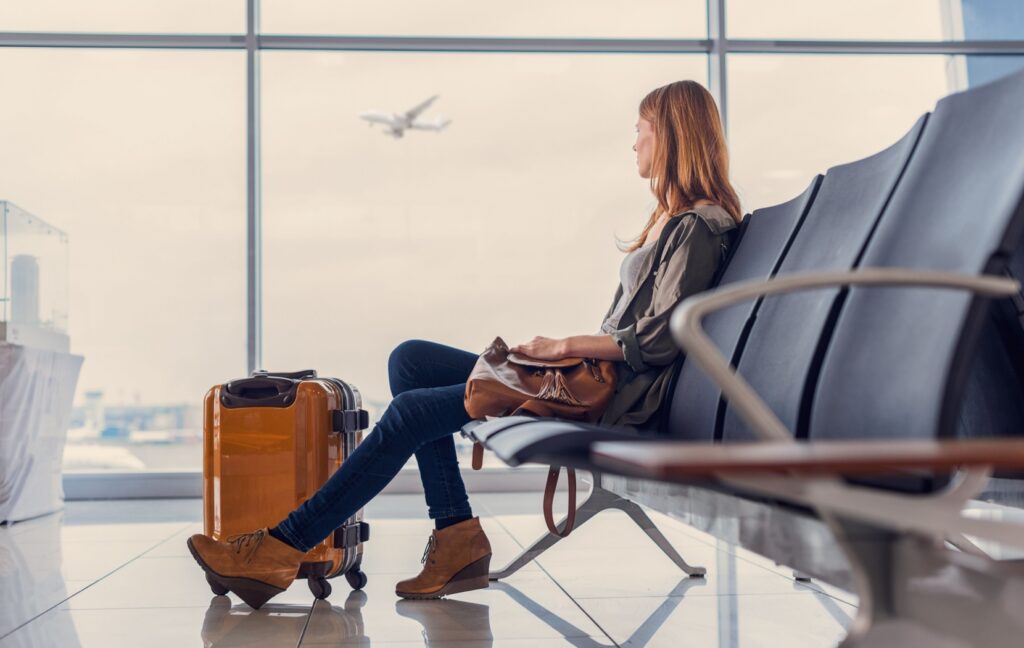Cataracts account for over 50% of vision loss cases worldwide. While you can manage mild forms of cataracts with eyeglasses or contact lenses, cataract surgery can offer significant vision recovery for those with severe cataracts.
However, many people need to travel to see their surgeon for cataract surgery, often by plane, raising concerns about the safety of air travel post-surgery.
Luckily, flying on a plane is safe as soon as 24 hours after cataract surgery. However, you should wait until after your post-operative examination so your surgeon can assess whether you’re experiencing any complications from your surgery and can give you clearance to fly.
What Are Cataracts?
A cataract is when the proteins in the eye’s lens break down, resulting in cloudy, hardened spots. Cataracts typically develop in both eyes and can lead to symptoms like:
- Foggy or blurry vision
- Halos around lights
- Light sensitivity
- Dull or muted colours
- Difficulty seeing in dim lighting
Cataracts can lead to blindness in its later stages and may require cataract surgery to avoid severe vision loss.
What Happens During Cataract Surgery?
So, how does cataract surgery work? During the procedure, your eye’s clouded lens is removed and replaced with an artificial lens, allowing the patient to see clearly again. Like many eye surgeries, an ophthalmologist performs cataract surgery under local anesthesia.
Cataract surgery is minimally invasive, effective, and safe. However, there might be side effects after cataract surgery, including:
- Blurry vision
- Eye pain or discomfort
- Dry eye
- Light halos or glare
- Light sensitivity
- Droopy eyelids
Most side effects after surgery will only last a few days or weeks. But some symptoms, like dry eyes or a droopy eyelid, may last months or longer. If you’re concerned about the side effects you’re experiencing, consult your ophthalmologist immediately.
Is It Safe to Fly After Cataract Surgery?

You can fly after cataract surgery if you use caution and consider the timing of your flights. Every patient heals differently, and your surgeon will likely provide specific recommendations based on your recovery process.
Generally, it’s safe to fly the day after cataract surgery. However, the first few days after cataract surgery are crucial for healing, and stressful environments like travelling and flying may lead to stress and slow down your healing.
In addition, your ophthalmologist will likely recommend you wait to fly until after they can examine your eyes after your surgery to make sure you aren’t suffering any complications.
Tips for Flying After Cataract Surgery
If you’ve confirmed with your ophthalmologist that it’s safe to travel after your cataract surgery, follow these helpful tips to enhance your flight comfort and maintain your healing progress.
1. Keep Your Eye Protected
Post-surgery, your surgeon might provide you with protective eyewear or a shield. Wear this as recommended to safeguard your eye from accidental contact or excessive exposure to light while travelling.
2. Stay Hydrated
The dry air in airplane cabins can cause discomfort, particularly in your newly operated eye. Bring artificial tears, as recommended by your doctor, to prevent eye dryness. Make it a point to stay hydrated throughout the flight, as well.
3. Avoid Heavy Luggage
Lifting heavy items, such as placing a carry-on in the overhead bin, can strain your body and increase eye pressure. Consider travelling light or asking for help from airline staff or fellow passengers.
4. Follow Your Medication Schedule
Continue using your prescribed eye drops and medications on schedule, even during travel. If your flight is a long one, set reminders or alarms to stay on track.
5. Bring Sunglasses
Your eyes may be extra sensitive to light after surgery. Sunglasses can help make your trip more comfortable, especially when exposed to bright lights.
6. Attend a Follow-up Appointment First
Your surgeon will typically schedule a post-operative checkup within 24 to 48 hours of your surgery. Attending this appointment is essential to confirm that your eye is healing properly and that you’re in the clear to fly.
Signs to Watch Out for During & After Your Flight
While air travel is generally safe after cataract surgery, you should monitor your eye for unusual symptoms during or after your flight. If you experience any of the following, reach out to your healthcare provider immediately:
- Some mild irritation is typical, but intense or worsening pain could indicate a problem
- If your vision becomes cloudy or blurry, it might be a sign of swelling or other complications
- Excessive redness or unusual discharge may suggest an infection
Having your surgeon’s contact information handy while travelling is a good practice, just in case any concerns arise.
Stay on Top of Your Eye Health Before & After Surgery
Cataract surgery can help you reclaim your vision after experiencing cataracts. While it’s safe to fly soon after your cataract surgery, following your ophthalmologist’s instructions after surgery is essential to set yourself up for a successful recovery. Advance Eye Care Center uses personalized care and modern technology to provide thorough eye care. If you’re wondering if you have cataracts or want to learn more about cataract surgery, you can schedule an appointment with us today.





